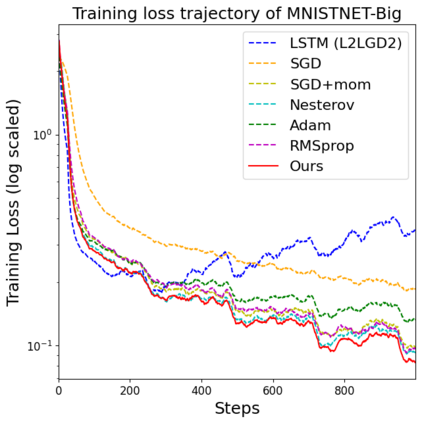Efficient and automated design of optimizers plays a crucial role in full-stack AutoML systems. However, prior methods in optimizer search are often limited by their scalability, generability, or sample efficiency. With the goal of democratizing research and application of optimizer search, we present the first efficient, scalable and generalizable framework that can directly search on the tasks of interest. We first observe that optimizer updates are fundamentally mathematical expressions applied to the gradient. Inspired by the innate tree structure of the underlying math expressions, we re-arrange the space of optimizers into a super-tree, where each path encodes an optimizer. This way, optimizer search can be naturally formulated as a path-finding problem, allowing a variety of well-established tree traversal methods to be used as the search algorithm. We adopt an adaptation of the Monte Carlo method to tree search, equipped with rejection sampling and equivalent- form detection that leverage the characteristics of optimizer update rules to further boost the sample efficiency. We provide a diverse set of tasks to benchmark our algorithm and demonstrate that, with only 128 evaluations, the proposed framework can discover optimizers that surpass both human-designed counterparts and prior optimizer search methods.
翻译:优化的高效和自动化设计在全堆式自动自动移动系统中发挥着关键作用。然而,优化的先前搜索方法往往因其可缩放性、可基因性或样本效率而受到限制。为了实现研究和应用优化搜索的民主化,我们提出了第一个可以直接搜索有关任务的有效、可缩放和可推广的框架。我们首先观察到优化更新基本上是适用于梯度的数学表达式。在原始数学表达式的内在树结构的启发下,我们重新将优化器的空间排列到一个超级树上,每个路径都编码一个优化器。这样,优化的搜索可以自然地形成为路径调查问题,允许使用各种成熟的树木穿行方法作为搜索算法。我们采用了对蒙特卡洛方法的修改,以树木搜索为目的,配有拒绝抽样和等式检测,利用优化更新规则的特点进一步提高样本效率。我们提供了一套多样化的任务,以衡量我们的算法,并表明,只有128项评估,拟议框架可以发现最佳的优化器,超越了以前的对等单位和对等单位。









